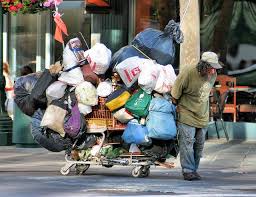In June 2013, my town of Calgary, Alberta experienced flooding on its main river, the Bow. As a result my neighbourhood, Sunnyside, was evacuated for nearly a week due to flooding and electricity being cut. Inspired by this, I realized that I had accumulated many possessions that I did not need. So to start, I threw out my old textbooks, and a tape-based camcorder.
It made me feel so great. I realized that throwing things away felt much better than buying things in the first place. Still, it was hard to give up the idea that eventually I might find them useful and so I would regret throwing them out. So it took me a long time to reach my current minimalist apogee.
Now, having sold my car today, I own only the following items:
- A weeks' worth of casual clothes
- A week's worth of formal clothes
- Some athletic clothes
- My glasses and sunglasses, and their cases
- A laptop
- A mobile phone
- A toiletries case
- A suitcase, garment bag, duffel bag, and laptop bag.
All items except the formal clothes and glasses are listed in this Amazon Wish List of 18 items worth 1,826 USD.
I am able to live without possessions thanks to some innovations that have taken place over the past few years:
- I scan all documents using my mobile phone and store them on Dropbox.
- I rent cars or use Car2Go or Uber.
- I eat Soylent (or Nutberg while in Asia) rather than preparing meals.
- I stay in an AirBnB or in hotels rather than owning furniture or an apartment.
- I'm able to work remotely thanks to various cloud services like Google Hangouts, Jira, GoToMyPC, Trello, Google Docs, Amazon Web Services, and GitHub.
- I use a Kindle instead of books.
- I have my physical mail sent to a mail forwarding service.
- I keep my skis, bike and winter clothes at a storage facility. (Yes, this might be considered cheating...)
It is liberating to know that I am always packed and ready to go anywhere if needed. It's also relaxing not to have to keep track mentally of all kinds of possessions. It's stimulating to be able to live in different places all the time; even staying in a different place each month, breaking up the daily routine, I find very stimulating for my mind.
It occurred to me: how is this any different from the way I once lived as a university student? Isn't this just living in poverty? Is there a difference between poverty and minimalism?
“Minimalism is simply getting rid of things you do not use or need, leaving an uncluttered, simple environment and an uncluttered, simple life.”
When I was that university student ten years ago, I dragged boxes and suitcases of clothes I never wore from apartment to apartment, and I kept huge numbers of books, papers, and textbooks I never read. It's true I was constrained by my income somewhat, but I still wasn't leading a minimalist lifestyle.
As one's income rises it is natural to accumulate items over time. Unless you have a strong discipline to get rid of unnecessary items, it is very easy over time to have many things you don't need.
By analogy: A very simple computer program is minimal but also not functional. A complicated program that has minimal bloat is lovely to pivot. Elegance is orthogonal to program size.
To illustrate that orthogonality, here are examples from all four quadrants.
A poor non-minimalist
A poor minimalist
Dr James Hull, a Jaguar enthosiast and rich non-minimalist.
Steve Jobs, whose simple wardrobe made him a minimalist icon. A rich minimalist, indeed.



